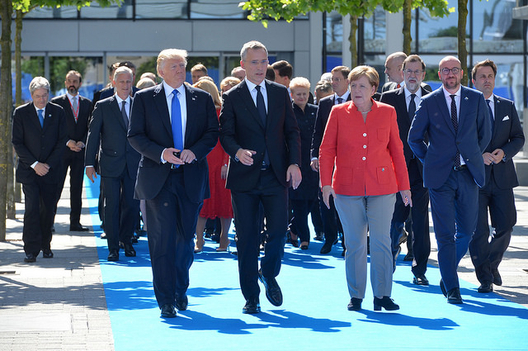 The European allies are deeply worried that they will confront the [President Donald] Trump who was on display at the meeting in June in Canada of the seven major economies, known as the Group of 7, or G-7. Those in the room described him as angry, mocking, wandering and rude, especially to the host, Canada’s prime minister, Justin Trudeau, and to Chancellor Angela Merkel of Germany….
The European allies are deeply worried that they will confront the [President Donald] Trump who was on display at the meeting in June in Canada of the seven major economies, known as the Group of 7, or G-7. Those in the room described him as angry, mocking, wandering and rude, especially to the host, Canada’s prime minister, Justin Trudeau, and to Chancellor Angela Merkel of Germany….
The Trump administration regards Western European nations as free-riders on an American-funded, postwar peace that enabled them to build lavish social benefit systems because they spent so little on defending themselves. He has also made clear that he thinks the European Union, as a trading bloc, has taken advantage of American generosity.
European and some American officials say they dread the same pattern — a noisy, divisive NATO summit, damaging deterrence, followed by a chummy meeting with a dictator, in this case Mr. [Russian President Vladimir] Putin, whose long-term goals are to destabilize the European Union, undermine NATO and restore Russian influence over Eastern Europe, the Baltic States and the Balkans.
Whatever the organization has prepared, “the only real deliverable for NATO summits is solidarity and cohesion,” said Douglas Lute, a former American general and ambassador to the organization. “But that is at risk because the odds are that Trump will deliver a G-7 performance. And I fear that we will come out of this summit with symbols of division….”
Even senior American officials said they had no clarity on Mr. Trump’s intentions for this meeting. They have told senior European officials that a lot will depend on Mr. Trump’s mood as he arrives and what is being highlighted on his favorite American news media outlets such as Fox News. And no one expects him to sit quietly through nearly two days of normally mind-numbing speeches by at least 28 other leaders….
The Europeans are also anxious about the fate of Mr. [Secretary of Defense Jim] Mattis, who is an outspoken supporter of the NATO alliance and an aggressive stance toward Russia.
With John Bolton as national security adviser and Mike Pompeo as secretary of state, Mr. Trump has rejected the defense secretary’s advice on North Korea and on preserving the Iran nuclear deal.
At the Group of 7 meeting, Mr. Trump approached some European leaders and asked them for their thoughts on Mr. Mattis, said Ms. [Center for a New American Security expert Julieanne] Smith, who was deputy national security adviser to Vice President Biden.
“It was awkward for them and might be the kiss of death,” if they praised him, she said, “so they said deliberately that he is being so tough on us on 2 percent defense spending, to try to save the guy….”
In a speech last week, the United States assistant secretary of state for European affairs, A. Wess Mitchell, acknowledged progress in military spending, while urging greater efforts.
“Since January of last year, every member of NATO but one has increased defense spending,” he said.
“The number that will spend 2 percent of GDP on defense by 2024 has more than tripled (from five to 18). The number allocating at least 20 percent of their military spending to major equipment purchases has more than doubled (from 14 to 26). And the alliance as a whole has increased military spending by 5.2 percent (or $14.4 billion) — the largest one-year surge in defense spending in a generation.”
Mr. Trump’s apparent admiration for Mr. Putin is also raising concerns, said François Heisbourg, president of the International Institute for Strategic Studies and a French defense analyst.
Mr. Trump “may act on his instincts and try to do a bilateral deal with strongman Putin and sacrifice NATO interests — he might lift sanctions on Crimea, cancel military exercises or withdraw American troops from the Baltics,” Mr. Heisbourg said. “We saw it with Kim Jong-un.”
There is also concern that because Mr. Putin objects to any new NATO member, Mr. Trump may try to block an invitation for the newly named Republic of North Macedonia….
“The irony is that this should be a good NATO summit, with consequential improvements of deterrence,” said Tomas Valasek, a former Slovak ambassador to NATO who now runs Carnegie Europe. “But with the memories of the G-7 fresh, the headlines will be all about the leaders and the mood of Donald Trump.”
Image: President Donald Trump, Secretary General Jans Stoltenberg, and German Chancellor Angela Merkel, May 25, 2017 (photo: NATO)
